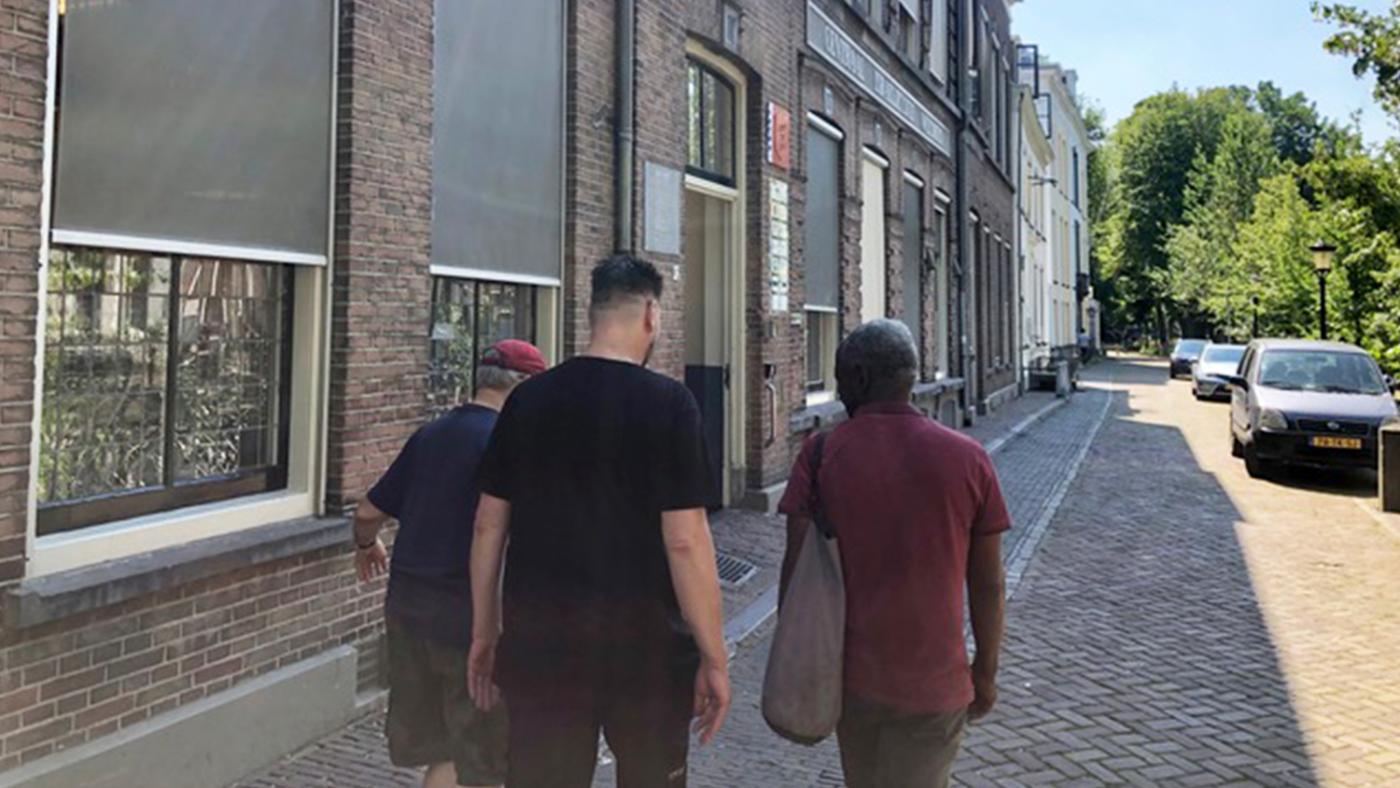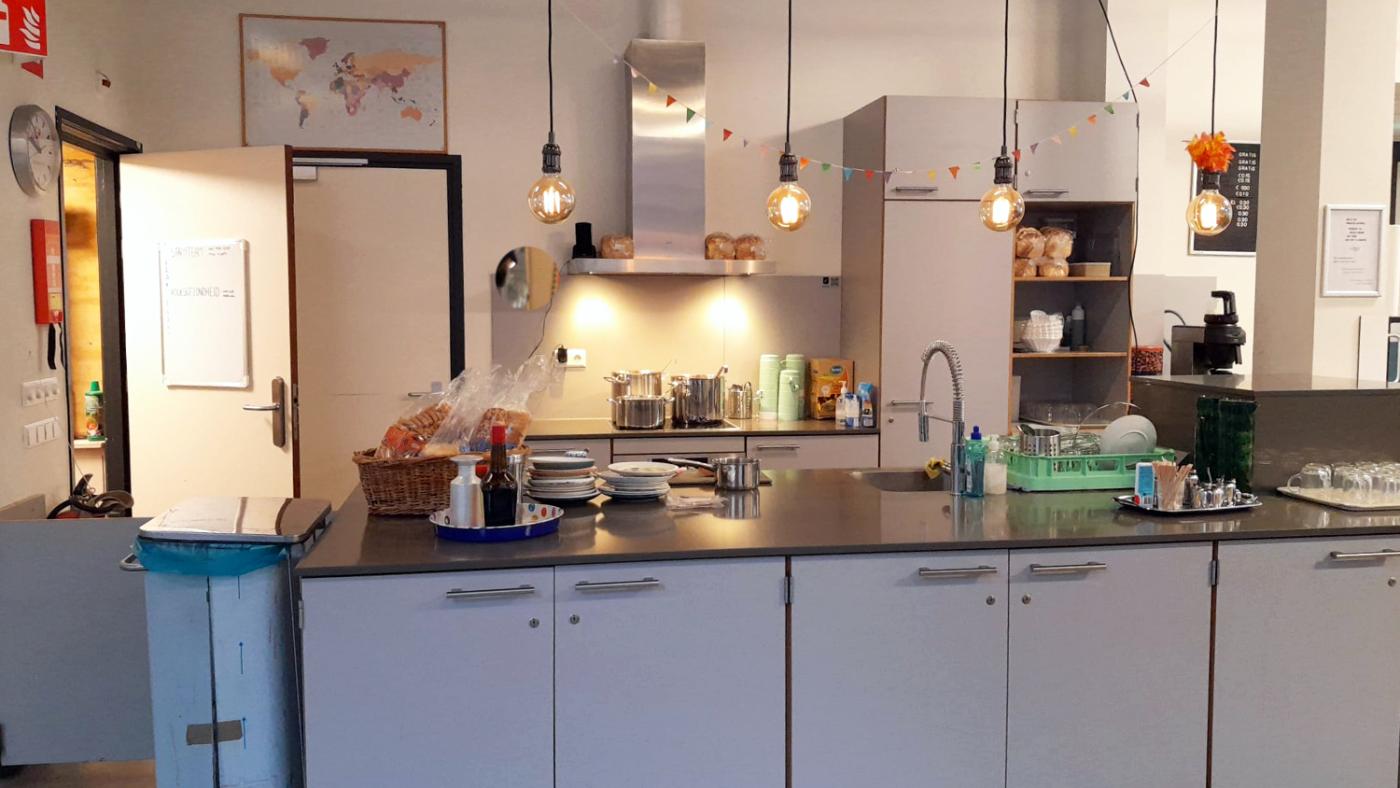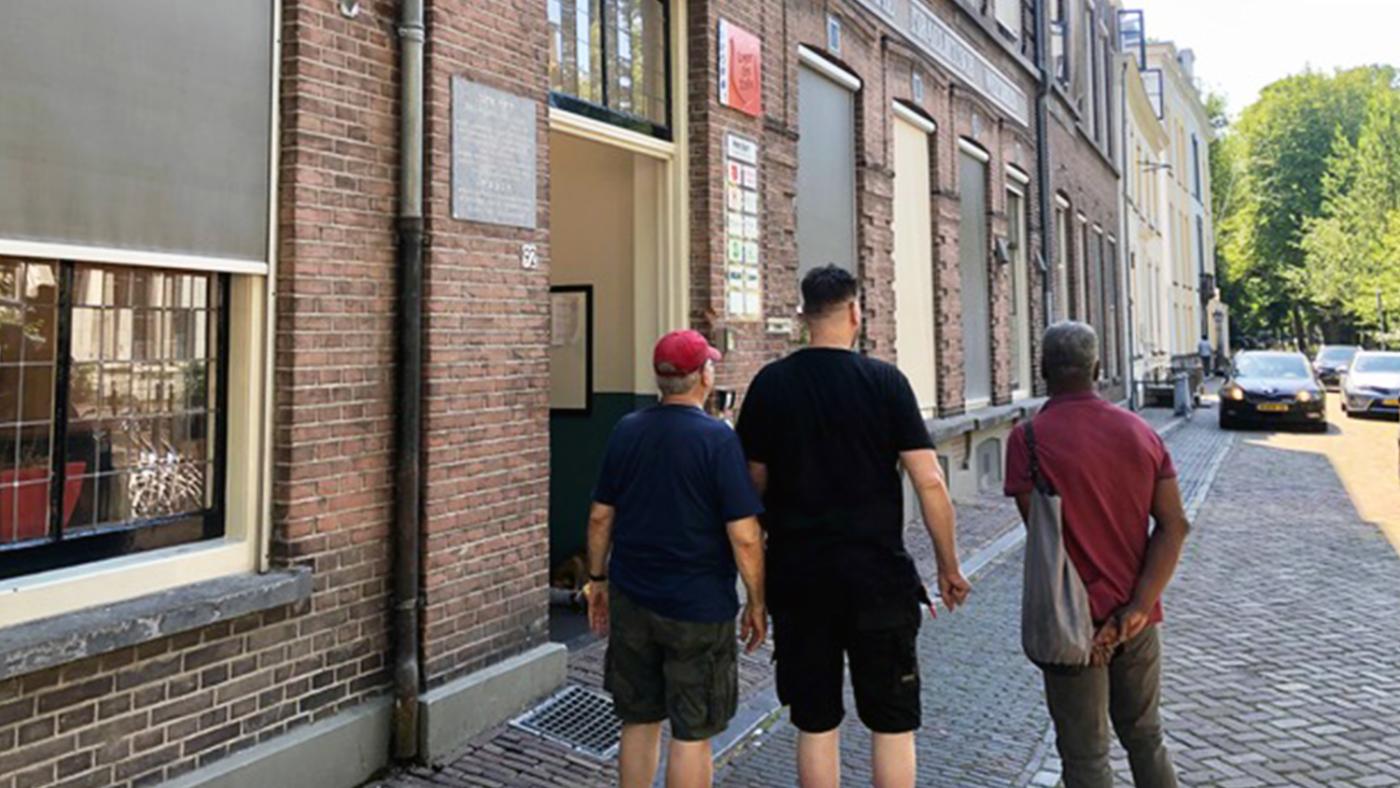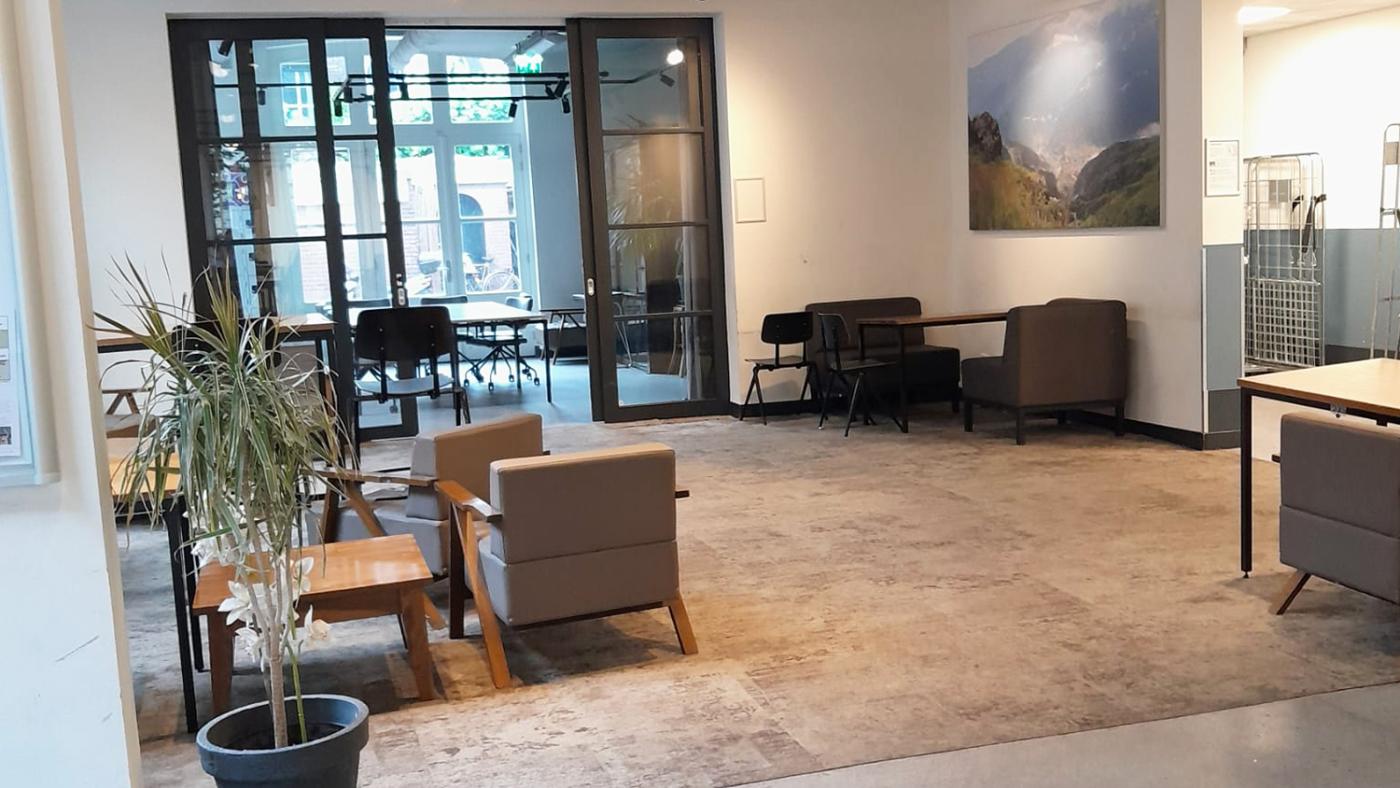What do Salvation Army visitors think about Utrecht students?
‘They complain about their grants, but then you see them drinking all that beer’

It might not be apparent at first glance, but UU students have much in common with the homeless. Both groups struggle financially and are victims of the housing shortage. They wander the streets of Utrecht at night, a can of beer in hand, and can often be found in the same places, such as Lucasbolwerk and Lepelenburg Park. In addition, they are both targeted by negative stereotypes. But do those worlds ever collide? How do homeless people view university students? DUB interviewed Salvation Army visitors on Nieuwegracht.
The Salvation Army has a walk-in facility at Nieuwegracht 92. It is intended for people without a home or people with an unstable housing situation. The nationalities of the visitors vary, but many of them are Eastern Europeans. Most visitors are men aged 40-50 on average. Everyone is welcome to come in and get free tea, bread and soup. Visitors pay a small fee for coffee and sandwich fillings. They can also take a shower there and get medical help or support in finding a job. The Herstart location is largely run by volunteers and interns.
As DUB enters the space, the living room is quite full. There are about fifty visitors inside. A group on the left is playing cards at a table, while, on the right, a few people are sleeping in chairs. “What are you doing?” asks Jaap* when I join him and several other visitors. “I’ve come to ask you some questions. I’d like to know what you think about students,” I say. Jaap: “Why? That’s not interesting at all, is it?” I reply that I think it would be interesting for students to read how they are perceived by others. He shrugs. “She wants to know what we think about students,” he shouts to Bert, a fellow visitor. “They don’t study enough and party too much!” he says. He joins us, just like Yusuf* and Hans. “Well, what do you want to know?”

Salvation Army's "kitchen" on Nieuwegracht, where volunteers distribute soup, coffee and bread.
“There are both social and antisocial students”
When I ask Yusuf if he comes into contact with students, he says that he doesn’t meet them a lot, “but when I do see them, I immediately know that they are students. Their clothes, their look, the way they walk... You can tell,” he says. “Even if they wear the same clothes, you can tell the difference between a construction worker and a student!” adds Arnold, an installation technician who goes to Salvation Army occasionally for dinner and conversations. “How they move, their slang.” They also see students in the media often. Hans, a visitor who studied Information Technology at Utrecht Science Park, regards students who occupy buildings to protest for Palestine or make slut lists as “quite insane. But there are also good ones.” Then he fills other visitors in the slut list scandal.
Bernard, a homeless man who has lived in Utrecht for at least 30 years, often runs into students. He talks to students regularly in Hoog Catharijne and Neude, two places where he often spends the night. “Sometimes they come to me, sometimes I come to them. I just ask how they’re doing and we have a nice chat.” Bernard can also tell right away who is a student and who isn't. How? “By their behaviour! They are always in groups, make a lot of noise and do weird things,” he says with a laugh. “Dressing up, singing songs, doing tricks. I just think: 'Let them be.'” These are predominant stereotypes in their descriptions of students.
“Students are destroying the city!”
“Get rid of them!” Jaap responds fiercely when asked what he thinks about students. Jaap is a homeless visitor who has lived in Utrecht for at least 40 years. “There are few rental spaces for us because students are always given priority, even though they are bad neighbours and troublemakers.” Bert agrees: “They don’t take anyone into account at night, as if the world was theirs.” Bert doesn't have a degree, but he used to show first-year students around during Kei-week, Groningen University's introduction week. He says there are different types of students and that he is often bothered by those who make a lot of noise when cycling past his house. “Sometimes I get the impression that some of them never study, all they do is party.” However, Bert considers a university to be an enrichment for a city as it makes it more lively.
“My view is positive,” says Bernard. “They’re just having fun.” Arnold, an installation technician sitting next to him, disagrees. “They’re not always the nicest people and they’re derogatory towards women.” He also cites the slut lists, which he read about in the news. “They think they’re better than others, but they’re not, not at all. When they are in groups, they’re scum, but individually they’re nice people.” When I ask him for examples, he doesn’t elaborate.

Three visitors in front of the entrance to the Salvation Army.
“They complain about their grants, but then you see them drinking all that beer.”
Bernard, who is mostly positive about students, mentions that they drink a lot. Arnold adds: “Students drink and use a lot of drugs, but are always seen as harmless.” He talks about the nuisance on Lucasbolwerk, which is best known for the hassle caused by addicts, some of them homeless. “That’s hugely exaggerated, when, in reality, it’s not that bad compared to what students are using. Students are always complaining about their grants, but then you see them sitting there, drinking all that beer.” It's almost as if they wanted to have a bad rep on purpose, says Arnold, who is also disappointed that they are taking over the housing market. In his view, some students are a bit naïve when it comes to long-term plans. “They are crazy to pay 800 euros for a room. You’ll screw up the whole market by doing that!”
“Students are not aware of their privilege”
When I ask Yusuf if he is ever jealous of students, he says he isn’t, yet he makes a doubtful face immediately afterwards. “Well, the only thing I’m jealous of is the bars and nightclubs where they can dance. We don’t have that." A passing visitor says: "You can just go there, you know that?” Yusuf replies: “Yes, but I'd be the only foreigner and people would stare at me."
Bernard says that he is only jealous of students who have opportunities but don’t take advantage of them. He wishes that someone else could have those opportunities, like people from his native Sierra Leone. Bert agrees. “I don’t think students have it easy, apart from those with rich parents who can afford anything and party all day, like those at Janskerkhof.”
Arnold tells me he is not jealous at all. “When you hear stories about all the trouble, the difficulty they have finding jobs, I don’t think we should be jealous of that.” Jaap and Bert note that the housing market is a problem for both students and homeless people. “But the municipality does a lot for students. Parties, discounts, they don’t do that for those who are not students.” Arnold agrees that students are protected by the municipality. Salvation Army visitors can’t say as much, he sighs.

The living room before opening time.
“You remain a student all your life”
“If I could start over, I would try harder,” says Yusuf. “I'd get some diplomas and a better job as that matters a lot." Jaap jumps in: "I would have liked to continue studying, but my parents didn’t have the money." Bert also says he would have studied if his parents had the means. “Sociology or something.” Arnold doesn’t mind not having a university degree as he sees that some degrees are considered important, while others are “empty". I ask him to mention an example. “Communication Science. What is that? Everyone can talk, right? Art history... That’s nice, but what does it mean?”
When asked if they would like to swap places with students for a day, their answers vary. One misses the experience of being a student and would like to take advantage of the opportunities given to unmotivated students, while the other would prefer to keep his life as it is now. Arnold puts it this way: “Actually, you are a student all your life. You learn something new every day, right?”
*These two names are fictitious at the request of the individuals portrayed, for privacy reasons. Their identity is known by DUB.